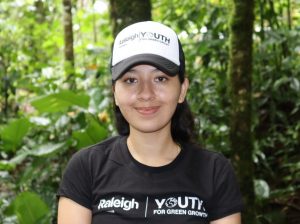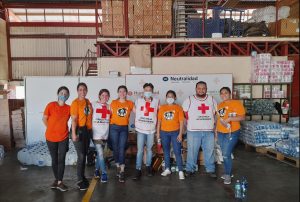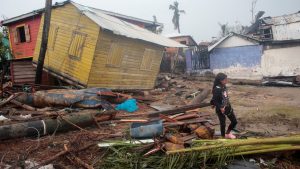Alumni Update: Lessons Learned from the Hurricanes in Nicaragua

In this highly uncertain time, I am encouraging myself to become more resilient. Journaling has helped me accomplish this goal, which is what got me to write this article. As it turns out, if you give yourself the chance to listen and embrace your thoughts (as irrelevant as they seem to be), you can get to know yourself a little bit more and thus better understand others and what happens around you.
Journaling is not all I do to find resilience, though I have also found it by helping others and engaging in the things that matter to me. I am an active World Vision volunteer and last year I was a part of a response effort to send aid to the people affected by hurricanes ETA and IOTA, which affected Central America, one after the other, from October 31 to November 18. From that experience, I learned two lessons to which I believe people may relate, no matter what crisis they go through:
- First Lesson: Fear numbs, but fear is not all there is.

When I thought about the communities left behind because they were not evacuated soon enough, heard the stories of people that lost everything, and saw the damages caused by the hurricanes, I felt overwhelmed by fear. I could not do anything but watch the news. I often thought that, while I was in a privileged and safe location, people in the areas hit by the hurricanes lacked every basic service that should be provided in an emergency. I was unable to respond effectively to the situation. The numbness I felt was not interfering with my feelings, but with my ability to take action; it was a physical numbness caused by fear. That realization and finding out that others quickly organized and looked for ways to help changed my perspective, and then, there was also room for hope.
- Second Lesson: Inaction is what we all should fear the most.
At one point, I also thought that being able to help and not doing so felt like sabotaging my power, and so I moved from my state of numbness and sought opportunities to help. At World Vision headquarters in Nicaragua, I found those opportunities. A group of volunteers and I took turns to receive clothes, food, and hygiene kits donations. Later, we also assisted the Red Cross by putting together food packages and cleaning products. All of that aid would later travel more than 230 miles to the Caribbean Coast and other areas affected by the hurricanes.
All that happened in 2020 was not just the result of just a bad year. If you check every event with detail, you may find that it is all connected to something we have chosen to ignore for too long, like global warming. It is known the rising temperatures in the ocean make hurricanes more powerful. It is also a fact that developing countries are affected disproportionately by climate change, and this is especially true on the Caribbean coastline of Nicaragua, one of the poorest and least developed areas in the country, home to people of African descent and indigenous communities. After the impact of ETA and IOTA, there is no doubt that it will take a long time to recover from the damage. Nonetheless, I am hopeful people will keep helping, and I will follow their lead in my role as a volunteer.

For most of my life, I felt that protecting the environment is a responsibility that comes with being inhabitant of the world, however I never thought about the real scope of the inequalities caused by climate change until I witnessed it firsthand in my country. And so, again, moved by my fear of inaction, I joined a volunteering program called Youth for Green Growth. Y4GG is an initiative created by Raleigh Nicaragua that seeks to reduce the impact of deforestation by implementing an incentives program targeting small business owners and farmers who use forest land unsustainably to cultivate fruit and make their products. I am eager to start working on that project in 2021. I feel inspired by the fact that environmental activism is practiced by people from different backgrounds and I truly believe that addressing climate change requires a holistic approach. As a Civil Engineering student, I am beyond happy to learn from others that, just like me, felt the need to engage and take action.
Elif Shafak, a writer I have come to admire, says that the opposite of love is numbness. Looking back, I think about how the tragedies that have shaped our world and our personal lives have the potential to make us resilient, but that can only happen if we stay away from numbness and show love to ourselves and others. I discovered that my way to build resilience is by recognizing the power I have when I volunteer and by taking action on the things that matter to me. I am writing this with the hope that if just like me, you are in the need of it, you may find resilience that way.